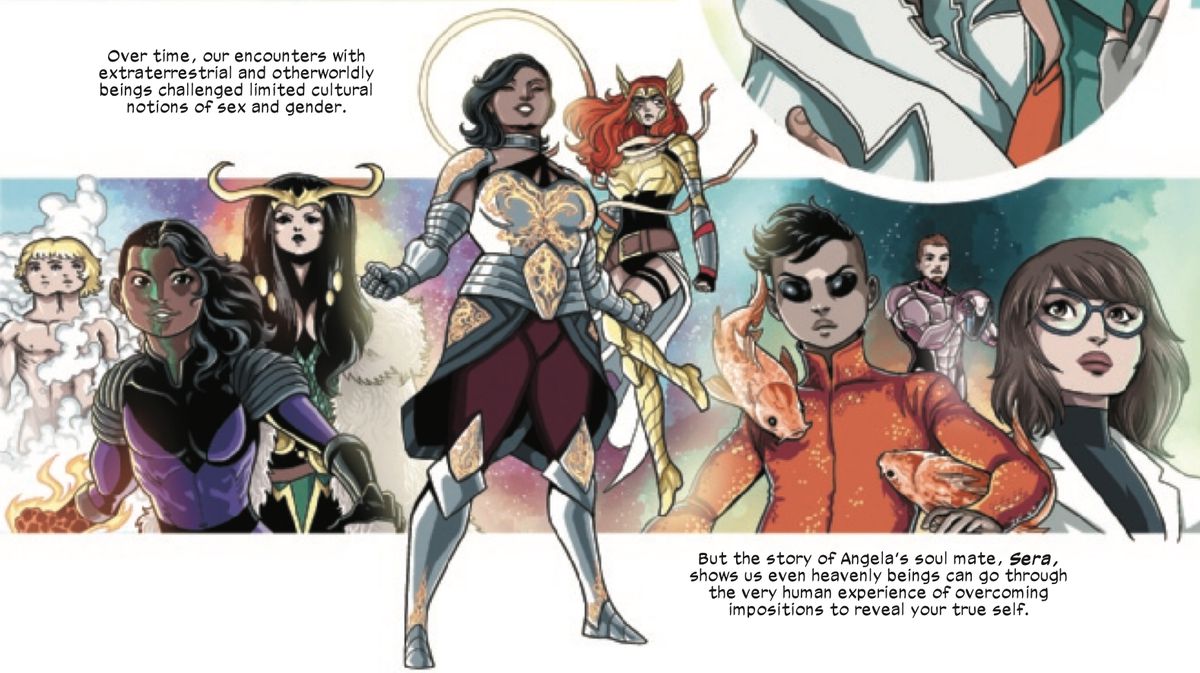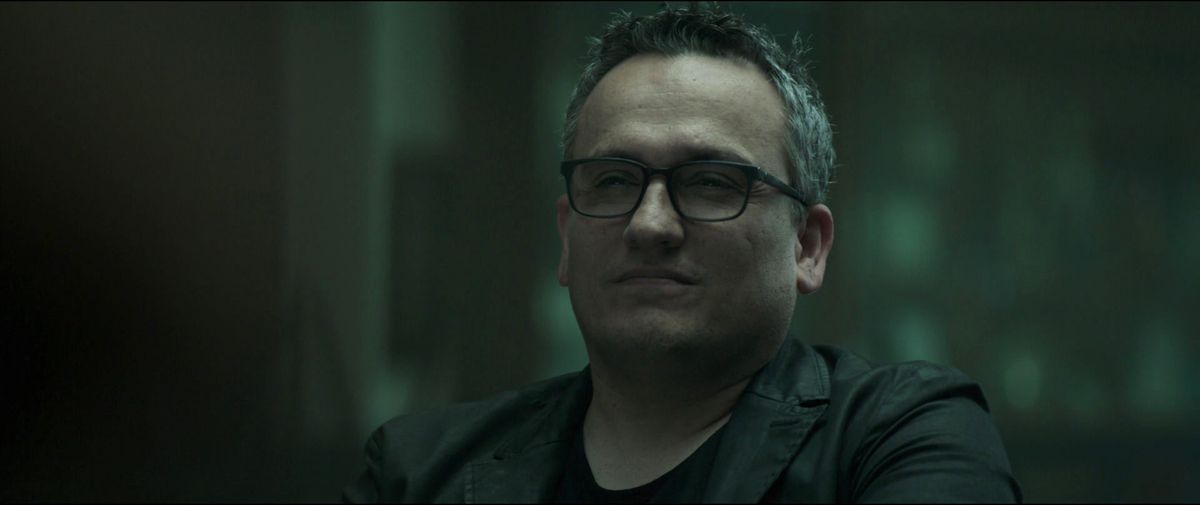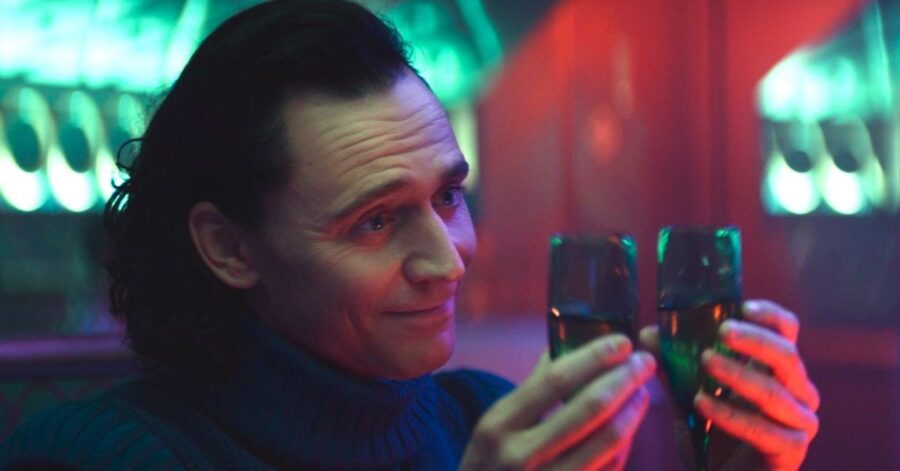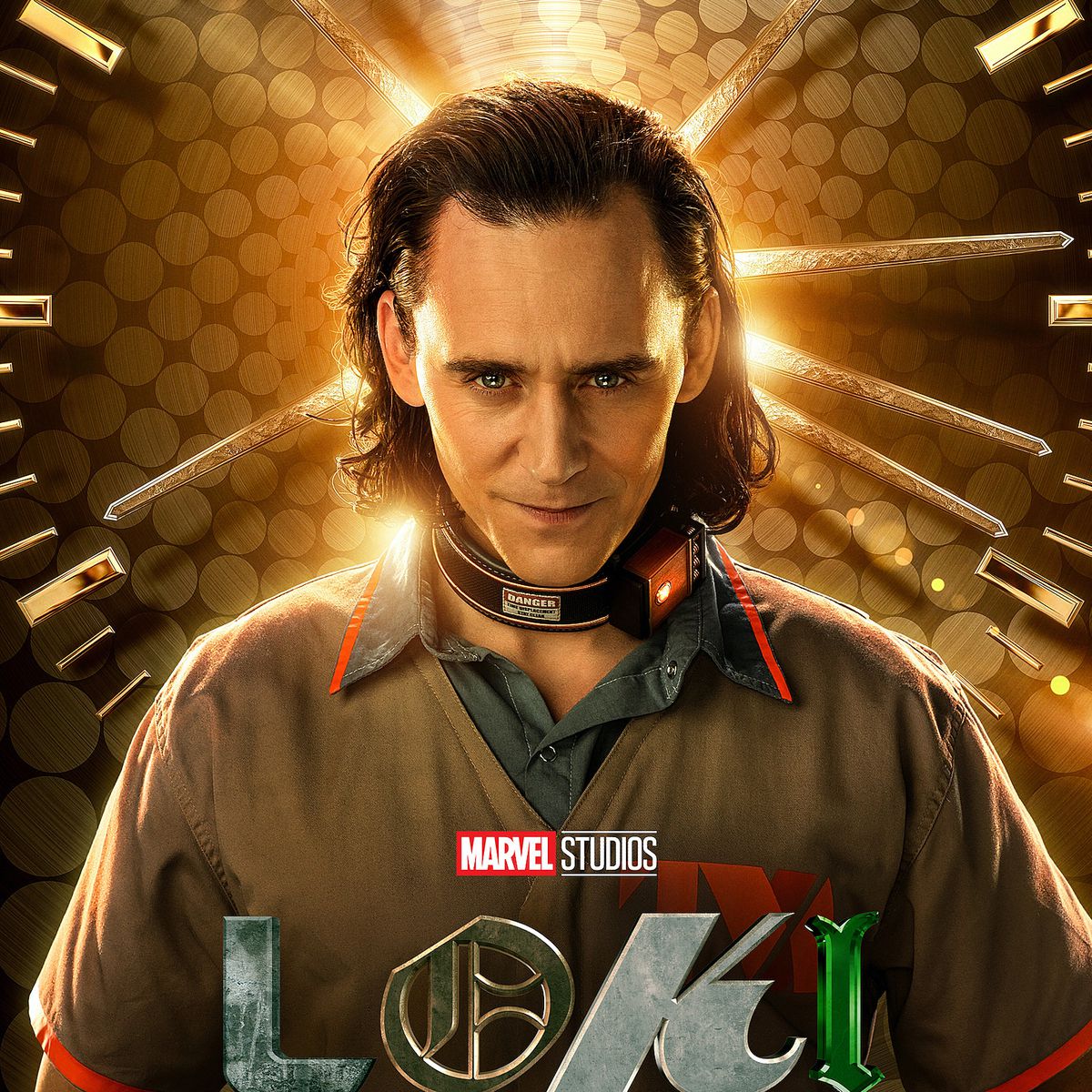In Loki episode 3, “Lamentis,” writer Bisha K. Ali and director Kate Herron cement some important Marvel Cinematic Universe canon: The God of Mischief is bisexual. The laidback revelation comes after years of fans wondering when and how Marvel could illustrate more LGBTQ+ representation in its sprawling ensembles and a general hope that Tom Hiddleston’s Asgardian might just come out and say it one of these days. And now, halfway through Loki, the god did, more or less.
[Ed. note: The following contains spoilers for Loki.]
While zipping along on a train traveling across the soon-to-be-obliterated planet Lamentis-1, Hiddleston’s Loki finds himself interrogating a female version of himself, a time variant who goes by Sylvie (played by Sophia Di Martino). The two have plenty to catch up on: Who was your mother? Did you know you were adopted? Who do you love? The relationship talk veers into romantic interests. Sylvie apparently dates a postman back in her version of Asgard.
“A bit of both,” Loki replies. “I suspect the same as you.”
For Herron, who shared screencaps of the moment on Twitter shortly after the episode’s Disney Plus debut, it was a coup.
From the moment I joined @LokiOfficial it was very important to me, and my goal, to acknowledge Loki was bisexual. It is a part of who he is and who I am too. I know this is a small step but I’m happy, and heart is so full, to say that this is now Canon in #mcu #Loki pic.twitter.com/lz3KJbewx8
— Kate Herron (@iamkateherron) June 23, 2024
Figuring how to express their sexuality, their love, may be the ultimate journey of our two Lokis in Loki. In the same scene, Sylvie suggests Loki’s ability to “love” might be a form of mischief. Loki pushes back. “No, love is … something I’ll have to have another drink to think about.” Thor is the one with the picturesque, heteronormative relationship. Loki has never had time to find the flicker of romance between plots to take over the world, or the timeline.
The decision to shade Loki with a queer identity — or in the case of episode 3, literally bathe him in bisexual lighting — is not without precedent. Like so much of what we see in the MCU, Loki is a product of decades of sculpting from comic creators, including a more recent understanding of the potential shapeshifting god’s identity.
The queer Loki of the comics
“Loki is bi,” Al Ewing declared on Tumblr back in 2017, preparing fans for the launch of his book Loki: Agent of Asgard. “He’ll shift between genders occasionally as well.’
Agent of Asgard picked up with the God of Mischief during a steady period of character transition, and provided a clear button to that change. Loki’s path from an uncomplicated wicked villain to flawed yet charming anti-hero was marked by several transformations. In 2007, Loki stole Sif’s body and committed trickery and betrayal against Asgard as Lady Loki before reverting. In 2010’s Siege arc, Loki was killed, but machinated the creation of Kid Loki, an entirely new version of himself who had a chance to live a life without committing heinous atrocities. Kid Loki eventually gave way to a new adult Loki who much resembled Tom Hiddleston’s compelling big-screen incarnation, with Loki: Agent of Asgard as his solo series.
It was a transformation that in some ways had to happen before Loki could be acknowledged as a canonically queer character — a Loki who was bisexual and genderqueer but also entirely villainous in the canon would simply be a retread of decades of homophobic media tropes.

Still, Loki has never really had a longstanding queer love interest — though he’s not really had many longstanding love interests at all, with the possible exception of Kid Loki’s relationship with Hela’s young handmaiden Leah. What’s much more clear about Loki, in canon and to fans, is that he enjoys taking on a female identity now and then. Though as an immortal god who can naturally shapeshift his experience is not exactly reflective of everyday human life, his gender fluidity has given many queer fans a sense of kinship with him.
Marvel’s struggle to make it gay

Image: Marvel Studios
LGTBQ+ characters have barely surfaced in the known MCU. Directors Joe and Anthony Russo took an eyebrow-raising victory lap after 2019’s Avengers: Endgame after “making history” for introducing the franchise’s first gay man at a post-Blip support group. The one-scene character was played by Joe Russo himself.
“Representation is really important,” Russo told Deadline of his cameo. “It was important to us as we did four of these films, we wanted a gay character somewhere in them. We felt it was important that one of us play him, to ensure the integrity and show it is so important to the filmmakers that one of us is representing that. It is a perfect time, because one of the things that is compelling about the Marvel Universe moving forward is its focus on diversity.”
Other than [checks credits] Grieving Man, no major, established Marvel character has been introduced as anything beyond the basic cis, heteronormative assumption. But with a vocal desire for queer characters, members of the Marvel family have gone out on a limb to retroactively reshape the canon and pressure the creative leadership for the future. After the release of Thor: Ragnarok, costar Tessa Thompson revealed that Valkyrie was actually a queer woman; sexuality-establishing scenes in which a female suitor left the Asgardian’s bedroom, and Valkyrie grieved her slain Asgardian lover were shot but then cut from the finished film. Hearing the cry of perturbed fans, Kevin Feige promised at the 2019 San Diego Comic-Con that Valkyrie would get her moment in Thor: Love and Thunder, as the new king of Asgard needed her queen.
During that same SDCC, Feige also promised that one of the male cast members of Eternals would be openly gay in a way that would feel totally new for the MCU. “He’s married, he’s got a family, and that is just part of who he is,” emphasized. Brian Tyree Henry, who can be seen in the film’s first trailer, has since confirmed that his character Phastos is gay.
That would be a departure from what has come to feel like Walt Disney Studios’ bi-annual announcement of the “first” gay character in a Disney or Pixar movie — that often boils down to a single shot or line of dialogue. An on-screen, obvious establishing moment that the title character of a Disney/Marvel project is attracted to both men and women seems weighty, though only by comparison.
But the fact remains that the Marvel Cinematic Universe’s Loki has never been seen seeking a relationship with anyone, regardless of their gender. And the sexless queer character is just as much a set-piece of homophobic propaganda as the villainous queer character.
All in all, if Walt Disney and Marvel Studios are becoming more comfortable with queer superhero characters, it’s not a moment too soon. The Scarlet Witch’s children — introduced as their pre-pubescent selves in WandaVision — are both canonically queer in Marvel Comics, as are the Dora Milage warrior Ayo (Falcon and the Winter Soldier, Black Panther: Wakanda Forever) and America Chavez (Doctor Strange and the Multiverse of Madness). And that’s without mentioning the multitude of queer characters in the world of the X-Men, including founding team member Iceman.
As Marvel Studios starts to pull from more recent comic book canon to fuel the next phase of the Marvel Cinematic Universe, it will eventually have to contain more queer content than just dialogue, and more than occasionally.
Polygon – All
Source link
Related Post:
- Who is the bad Loki of Loki? Tons of variants exist in Marvel Comics.
- Tom Hiddleston on rethinking Loki so other actors could play him on Loki
- How to watch Loki on Disney Plus without marathoning every Marvel movie
- Marvel Villainous’ Loki set, an excuse to embrace your darkest and cleverest self • Eurogamer.net
- Loki director details the hidden sci-fi references in the Marvel Studios show
- You can’t get Nvidia’s RTX 3080 in real life, but you can build one in Valheim
- Good Guy Thanos in Marvel’s What If episode 2 was inevitable, says producer
- Take-Two confirms it’s announcing a new game soon. Will it be Marvel XCOM?
- Marvel’s Wolverine Will Have a “Mature Tone,” Creative Director Confirms
- Arkane Confirms You Can Play Deathloop Without Snapping Any Necks

